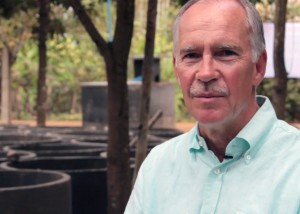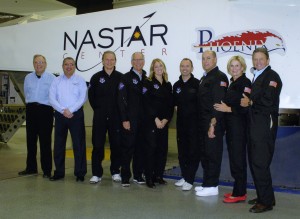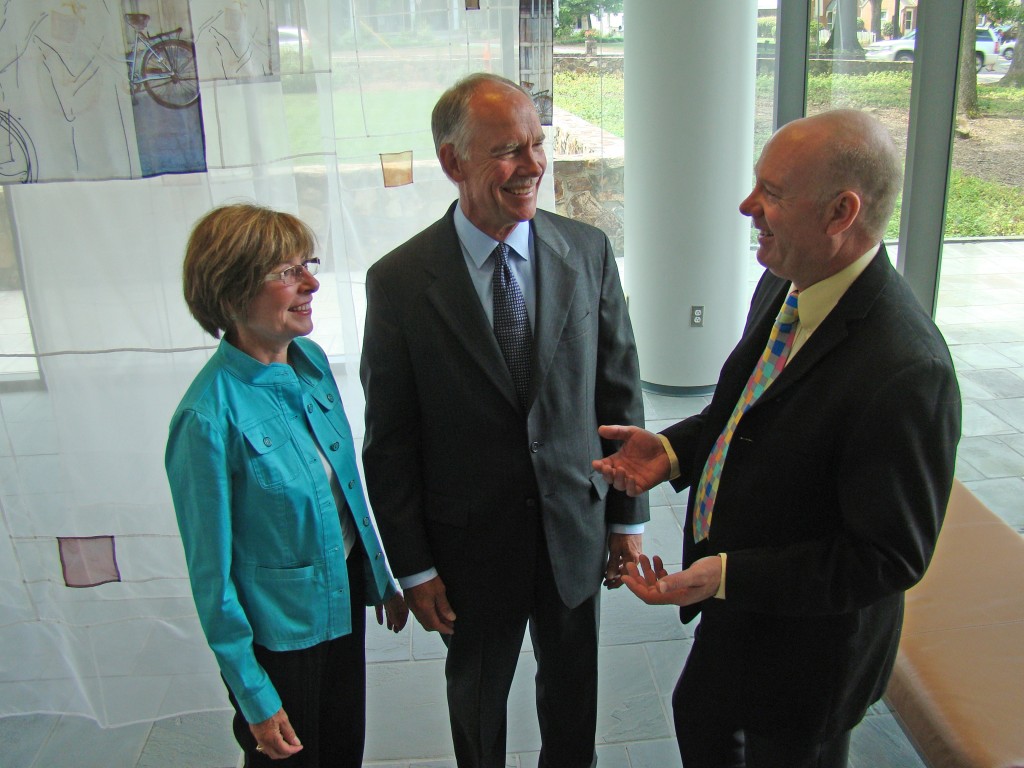Don Holzworth
May 4, 2015
.
The risk of betting personal futures, cash and credit lines on new start-ups, untried ideas and emerging markets is the essence of being an entrepreneur.
Don Holzworth, MS, the Gillings School’s executive in residence, took even greater risks in his own entrepreneurial pursuits. He has focused on solutions in public health and health care in both the U.S. and developing world.

In 2013, Holzworth visited Cambodia to learn about the work of WaterSHED and its innovative program to market sanitation products. (Photo courtesy of WaterSHEDAsia)
He has been inspired by helping those who live in more than 60 countries, for whom fresh water, basic sanitation, electricity and floors not made of earth are an exception to the rule.
His is entrepreneurial risk-taking, coupled with the desire to help people — but there’s another element involved, as well.
“I’ve always had a sense of adventure,” says Holzworth, with a smile. “Nothing too crazy, but I definitely like a challenge.”
Risk, adventure and entrepreneurism — and an eye on public health — figure into Holzworth’s next challenge — space flight.
Specifically, Holzworth is training to be among the first private citizens to venture into space on Virgin Galactic’s SpaceShipTwo.
For Holzworth, a suborbital flight more than 60 miles above the earth is the culmination of a lifelong dream.
“I grew up during the space race and greatly admired the Mercury astronauts — and then those in the Gemini and Apollo programs,” says Holzworth, who also chairs the Gillings School’s advisory council and previously was on the University of North Carolina at Chapel Hill’s board of visitors. “I wanted to be an astronaut, and John Glenn was my hero growing up. I even got to meet him twice.”
The first meeting was when Holzworth was in Boy Scouts. Years later, he met Glenn again when the surviving Mercury 7 astronauts came back to Chapel Hill, N.C., to commemorate the extensive celestial navigation instruction they received at Morehead Planetarium.
Holzworth credits scouting with stoking his sense of adventure. Hiking and camping in the Rocky Mountains and canoeing in the U.S.-Canadian boundary waters wilderness taught him to respect nature while giving him a new perspective on the limits he could approach and conquer. Through it all, he held fast to his dream of becoming an astronaut, so much so that he worked all through high school with a single goal in mind — to earn a commission to the Air Force Academy’s pilot training program.
“I did it, too,” he said, with a touch of pride in his voice. “But when I came to the crossroad, I decided to follow another path.”
The decision was motivated in large part by the Vietnam War. Rather than entering the Academy, Holzworth opted for a Bachelor of Science in systems analysis and a master’s degree in environmental sciences, both from Miami University in Ohio. He also received advanced graduate training in biostatistics at N.C. State University.
Hired as a biostatistician by Battelle Memorial Institute in Washington, D.C., he soon was promoted to principal research scientist and oversaw a staff of more than 40 people. Still, Holzworth’s sense of adventure remained strong. In the early 1980s, he accepted the vice-presidency of a 50-person entrepreneurial firm called Program Resources Inc. Within a few years, he had helped grow the business tenfold.
This began a series of entrepreneurial ventures. In the 1980s, he also founded the Constella Group, a consulting firm that he grew into a global player, implementing public health solutions in more than 60 countries.
He sold his interest in the firm in 2007 but remains active in implementing innovative public health solutions in sub-Saharan Africa as a board member of the Accordia Global Health Foundation and as founder of GivingPositively.org, a philanthropic effort to provide educational opportunities for healthy young adults living with HIV. In 2009, he became the Gillings School’s executive in residence and uses his expertise to advise students and faculty members who are interested in potential entrepreneurial ventures emanating from their studies or research at the School.
Holzworth continues to indulge a sense of adventure in his private life, as well. In his free time, he has gone skydiving, back-country skiing in the U.S. and Europe, bungee-jumping in New Zealand and scuba diving in oceans around the world. His desire for space travel never died — even though he knew, as time passed, it was becoming increasingly unlikely.
Then, fellow entrepreneur Richard Branson launched Virgin Galactic.
Branson, who had grown a one-man, mail-order record business into the global Virgin Group, which includes 400 entertainment, communications, hospitality and transportation companies, decided to take his success into space. Holzworth was intrigued, but he didn’t commit until he got a nudge from an important adviser.
“When my wife heard about Virgin Galactic, she said, ‘This is all you’ve talked about for years. You have to do it!’”
However, becoming a SpaceShipTwo astronaut involved more than signing on the dotted line and paying a significant fee. Challenging physical training is required. This includes two days at the National Aerospace Training and Research Center’s centrifuge, which simulates virtually every condition involved with space flight, including the intense gravitational (g) force exerted on the human body during lift-off and re-entry.

Holzworth, fourth from left, poses with his partners-in-training at the National Aerospace Training and Research (NASTAR) Center. (Photo courtesy of Virgin Galactic)
“The g-force — sometimes in excess of four gs — would come at you from different directions,” Holzworth says. “They taught us specialized breathing techniques so we wouldn’t black out. The entire process was just fascinating.”
Holzworth plans soon to ride NASA’s “Vomit Comet,” a specially-outfitted C-130 aircraft that uses parabolic dives at high altitude to simulate weightlessness. There also will be four days of training at Virgin Galactic’s New Mexico spaceport and then, if all goes according to plan, a journey into space sometime within the next two years.
“With Constella, our goal was to target a public health-related need and develop an innovation that provided an efficient solution to the challenge,” Holzworth says. “That’s how public health works — and it’s how space travel works. Set our sights on where we want to go, and find a way to get there.”
After several careers that challenged boundaries in global public health, Holzworth’s wish to be among the best drew him to the Gillings School and its commitment to excellence. Here, as consultant and adviser, he has ignited and fanned into flame the innovative ideas of student and faculty entrepreneurs — and yes, has helped them take flight.
Whether as business leader or astronaut, Holzworth’s reach tends to be significantly beyond his grasp. You’ll find him always moving toward the next frontier.
—David Pesci
Seeking out new frontiers is nothing new for Don Holzworth. After all, he spent more than 30 years of his entrepreneurial career bringing public health solutions to people who often received little attention from other organizations. He has made a difference in dozens of countries in the developing world, where companies he built have conducted groundbreaking policy and program development work, providing tools and guidance to ministers of health and community organizations to prevent the spread of infectious diseases.
“I am one of those people who believes that nothing is impossible,” Holzworth says. “We were sure we could produce positive results in places where other people said it was difficult or impossible, and on the whole, we were successful in our efforts.”
Holzworth is founder of GivingPositively.org, a nonprofit that helps HIV-positive Ugandan youth gain financial independence through tailored vocational training programs that enable them to make sustainable lives for themselves.
He is also on the board of directors’ executive committee of the Accordia Global Health Foundation, a nonprofit organization that works to reduce infectious disease outbreaks by building health-care capacity and strengthening academic medical institutions in sub-Saharan Africa.
Holzworth was appointed by President George W. Bush to the President’s Advisory Council on HIV/AIDS (PACHA), which influences domestic and international HIV/AIDS policy.
His generosity to the Gillings School — both in time and funding — has led to a number of advances. He endowed two scholarships and the Don and Jennifer Holzworth Distinguished Professorship of environmental sciences and engineering at the School. He also chairs the School’s advisory council.
Carolina Public Health is a publication of the University of North Carolina at Chapel Hill Gillings School of Global Public Health. To view previous issues, please visit sph.unc.edu/cph.

